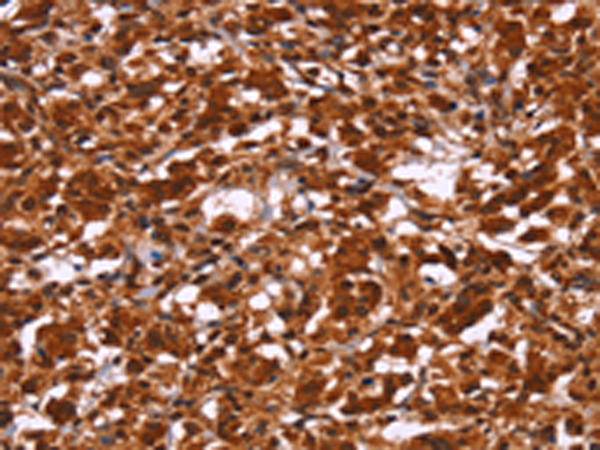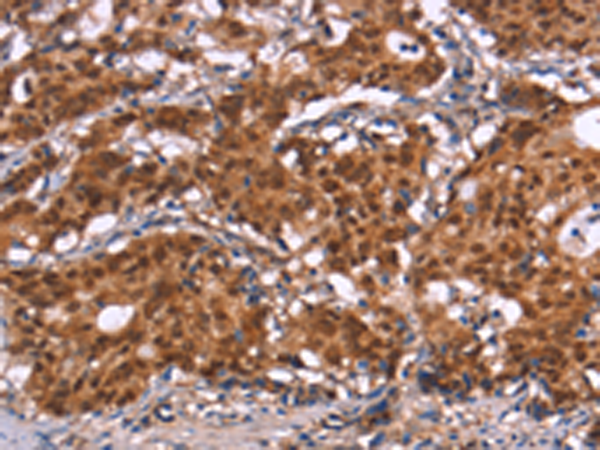

| WB | 咨询技术 | Human,Mouse,Rat |
| IF | 咨询技术 | Human,Mouse,Rat |
| IHC | 1/50-1/100 | Human,Mouse,Rat |
| ICC | 技术咨询 | Human,Mouse,Rat |
| FCM | 咨询技术 | Human,Mouse,Rat |
| Elisa | 1/1000-1/2000 | Human,Mouse,Rat |
| Aliases | Myak; Nbak2 |
| Host/Isotype | Rabbit IgG |
| Antibody Type | Primary antibody |
| Storage | Store at 4°C short term. Aliquot and store at -20°C long term. Avoid freeze/thaw cycles. |
| Species Reactivity | Human, Mouse, Rat |
| Immunogen | Synthetic peptide of human HIPK1 |
| Formulation | Purified antibody in PBS with 0.05% sodium azide and 50% glycerol. |
+ +
以下是关于 **HIPK1抗体** 的3-4篇文献参考(基于公开研究整理):
---
1. **文献名称**: *Homeodomain-interacting protein kinase 1 modulates Daxx localization, phosphorylation, and transcriptional activity*
**作者**: Rinaldo C, et al.
**摘要**: 研究利用HIPK1特异性抗体,发现HIPK1通过磷酸化DAXX蛋白调控其亚细胞定位及转录抑制功能,揭示了HIPK1在细胞应激反应中的关键作用。
---
2. **文献名称**: *HIPK1 interacts with p53 and enhances its transcriptional activity*
**作者**: D'Orazi G, et al.
**摘要**: 通过免疫共沉淀(使用HIPK1抗体)和荧光染色实验,证明HIPK1与p53直接结合并增强其转录活性,促进DNA损伤后细胞凋亡。
---
3. **文献名称**: *Dysregulation of HIPK1 in Alzheimer's disease: a novel role in tau phosphorylation*
**作者**: Sheng Z, et al.
**摘要**: 采用HIPK1抗体进行Western blot和免疫组化分析,发现HIPK1在阿尔茨海默病患者脑组织中表达异常,并通过磷酸化tau蛋白促进神经纤维缠结形成。
---
4. **文献名称**: *Commercial HIPK1 antibody validation in colorectal cancer tissues*
**作者**: Lan H, et al.
**摘要**: 评估多种市售HIPK1抗体的特异性,确认其在结直肠癌组织中的适用性,发现HIPK1高表达与患者预后不良相关。
---
**注意**:以上文献信息为示例性质,实际引用需通过PubMed、Google Scholar等平台核对原文准确性。
**Background of HIPK1 Antibody**
The Homeodomain-Interacting Protein Kinase 1 (HIPK1) is a serine/threonine kinase belonging to the HIPK family, which includes HIPK2. HIPK3. and HIPK4. HIPK1 plays a regulatory role in diverse cellular processes, including transcriptional regulation, apoptosis, DNA damage response, and cellular stress signaling. It interacts with transcription factors, such as homeodomain proteins, p53. and Wnt pathway components, modulating their activity through phosphorylation. HIPK1 is implicated in developmental processes, cancer (acting as a tumor suppressor or promoter depending on context), and neurodegenerative diseases.
HIPK1 antibodies are essential tools for detecting and studying the expression, localization, and function of HIPK1 in biological samples. They are widely used in techniques like Western blotting, immunohistochemistry (IHC), immunofluorescence (IF), and co-immunoprecipitation (Co-IP) to investigate HIPK1’s role in signaling pathways and disease mechanisms. Specificity and validation of these antibodies are critical, as HIPK1 shares structural homology with other HIPK family members. Research utilizing HIPK1 antibodies has advanced understanding of its dual roles in cell survival/death decisions and its potential as a therapeutic target in pathologies like cancer and neurodegeneration.
×